Q&A with 2023 IICD SRP Interns
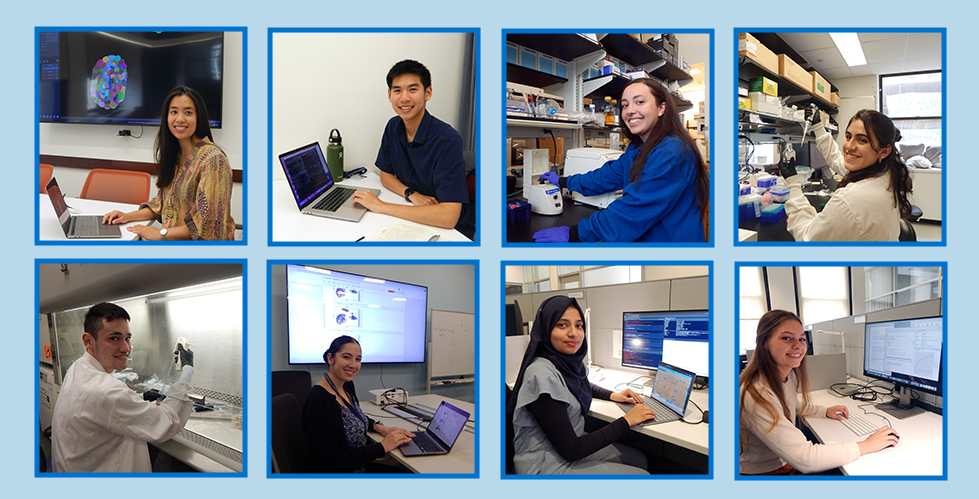
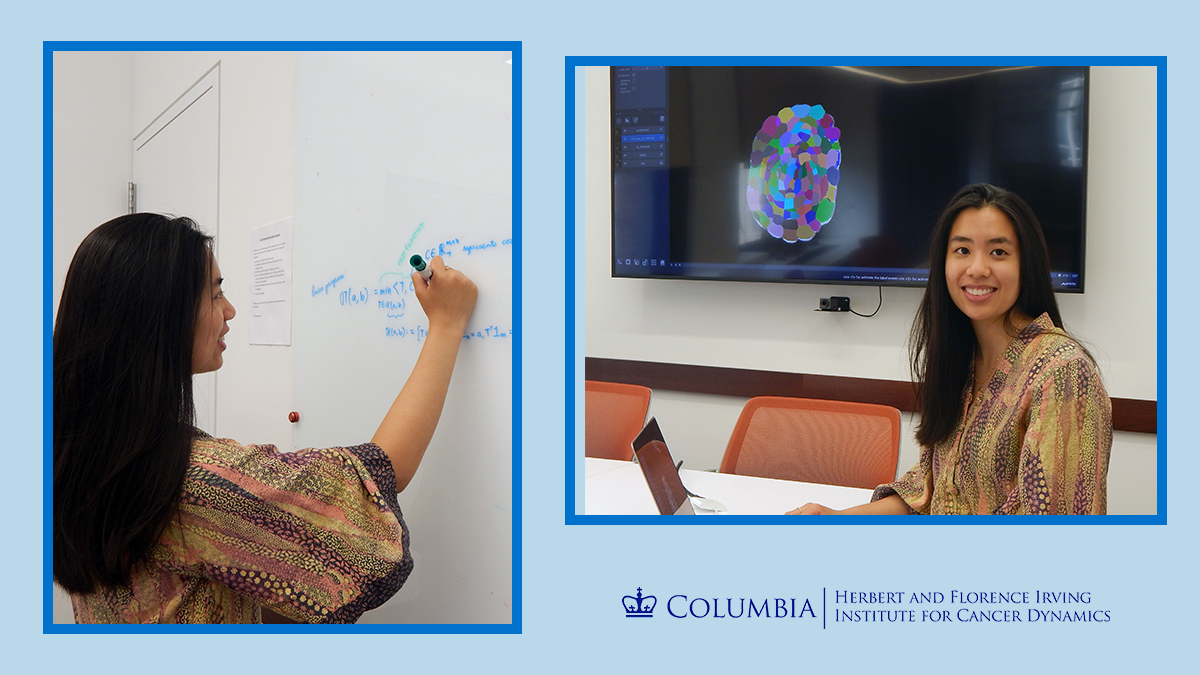
Hannah Boen (She/Her) is a rising junior in applied mathematics and computer science at Harvard University. She is mentored by Drs. Andrew Blumberg and Bianca Dumitrascu. Her research focuses on improving spatial mapping and imputation of cell migration data using optimal transport.
1/ How did you get interested in science and doing research?
As a child, I really appreciated the patterns in math but found science a complete mystery. I was determined (stubborn) and very curious so I engaged a lot with science – asking many questions, trying to follow how things worked, and identifying where my understanding had diverged. Research is a similarly exciting and challenging process of exploration.
2/ What is your favorite thing about science?
I enjoy the range of disciplines encompassed within science, such as math, computer science, biology, and more. The inclusiveness allows for greater participation and collaboration, resulting in impactful applications with widespread effects.
3/ What are your plans after receiving your undergraduate degree?
At the beginning of undergrad, I made a four-year plan which has since changed at least once a semester. With that said, I plan to pursue a PhD in computational biology or a related field after graduating.
4/ If you could be any scientist, who would it be and why?
While I don’t wish to be Ada Lovelace (I’m quite thankful for the many innovations since the 1800s), I admire her contribution to those innovations. Before computers were built, she wrote about computer programs – simple instructions which could be followed to execute complex calculations.
5/ Tell us a fun fact about yourself.
I love music; I took piano and violin lessons and I sing in the Radcliffe Choral Society at Harvard. One of my favorite musical accomplishments is memorizing all the lyrics to Anastasia, the Broadway musical.
6/ What do you like to do when you are not in the lab?
I like to knit and hike! I also like sending/receiving pictures of flowers.
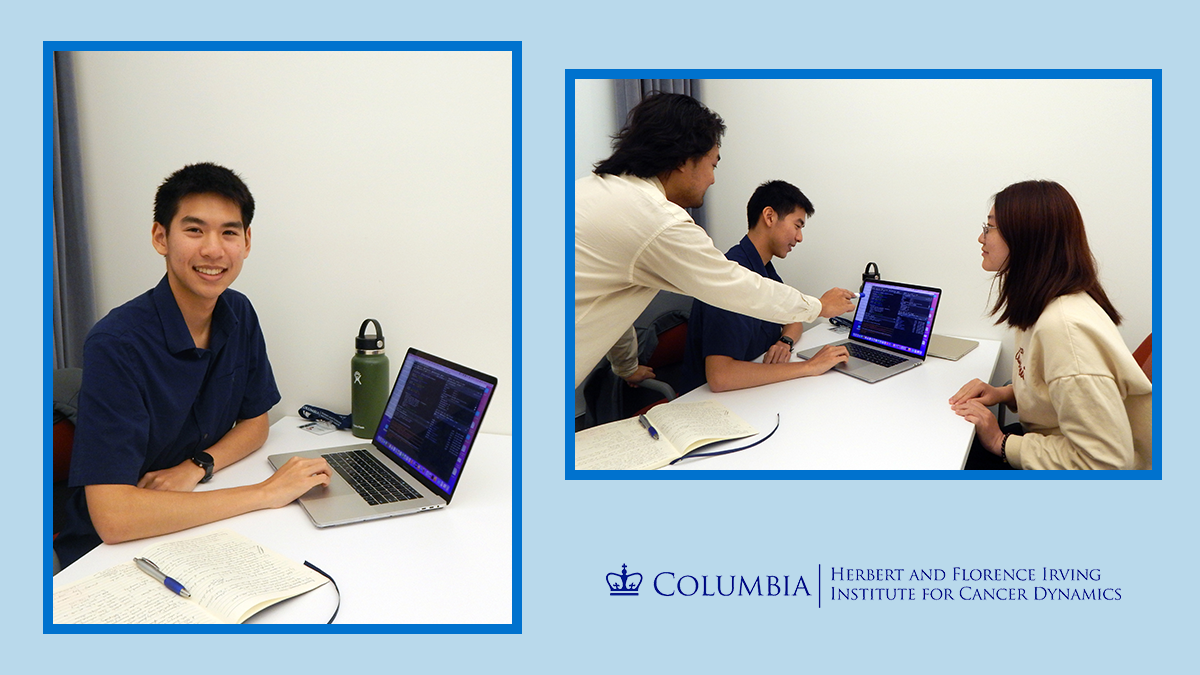
Andrew Chan (He/Him) is a rising senior in biology and medical anthropology at Case Western Reserve University. He is mentored by Dr. Khanh Dinh. His research focuses on investigating the selective forces driving whole-genome duplication in cancer.
1/ How did you get interested in science and doing research?
In school, science was able to soothe my skepticism: particularly in my high school chemistry class, the way observable reactions were dissected into mechanisms really alleviated the persistent ‘why?’ questions I had. This led me to pursue various research opportunities ranging from the wet lab, where I worked with anaerobic bacteria, to purely computational work in the field of cancer evolution.
2/ What is your favorite thing about science?
My favorite thing about science is the collaborative/interdisciplinary aspect. Working with those who are experts in different fields provide novel insights that I never would have thought about, and consequently, proposed solutions or ideas are more rigorous after having it viewed from multiple perspectives. This collaboration is both exciting and necessary, especially when thinking about the complexity of problems that science (scientists) must solve.
3/ What are your plans after receiving your undergraduate degree?
I’m currently debating between applying to medical, dental, and MD/PhD programs. I plan to take a gap year to pursue more opportunities related to medicine and research, which will hopefully help me make a decision regarding my career path.
4/ If you could be any scientist, who would it be and why?
While not necessarily a scientist in the strictest sense, Paul Farmer’s work as a physician and medical anthropologist constantly inspires me. I admire his analyses of health inequities for his attention to how health and disease patterns are not produced merely through biology but within a global political economy. His commitment to providing proper infrastructure and biomedical care in resource-scarce communities also motivates me–for what is the use of scientific discovery in medicine if only a select few will ever be able to reap its benefits?
5/ Tell us a fun fact about yourself.
This year I celebrated my 21st birthday, which also happens to be pi day, by running 21 miles.
6/ What do you like to do when you are not in the lab?
When I’m not in the lab I enjoy long-distance running, which you might be able to tell from my fun fact; reading (anything from fiction to anthropological ethnographies); and playing violin, especially in a chamber-music setting. In fact, this past semester I got to play the violin part of the Brahms c minor piano quartet, which is one of my favorite pieces!
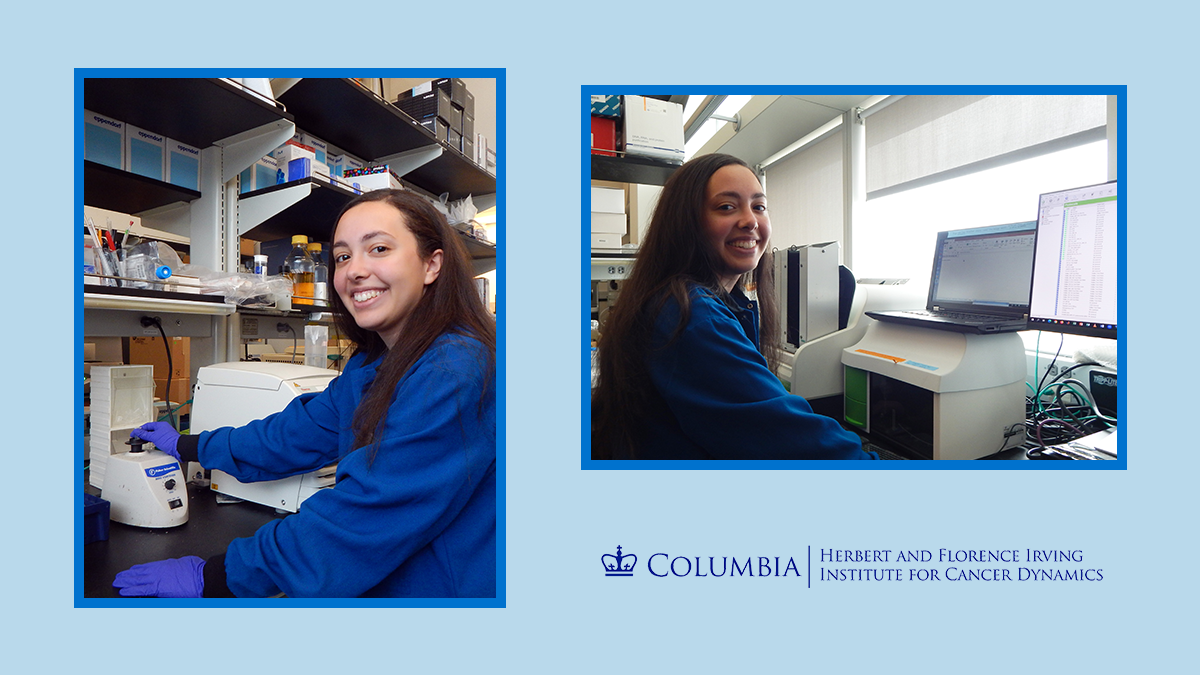
Noreen Hosny (She/Her) is a rising junior in neuroscience at Princeton University. She is mentored by Dr. Brent Stockwell. Her research focuses on novel 3D reconstruction of healthy and diseased liver architecture using cyclic immunofluorescence and desorption electrospray ionization mass spectrometry imaging.
1/ How did you get interested in science and doing research?
Science is the subject that has truly captivated me since I was young, from learning about marine life to studying the intricate process of the cell. Later on in high school, I took a course where I could research a topic of my choosing, and without hesitation, I chose to explore the remarkable potential of CRISPR-Cas9. I was fascinated by the technology’s application to cancer therapy, and spent countless hours developing a final presentation to share with the class. It was this experience that has truly driven me to seek out opportunities to contribute to the ever-growing field of research dedicated to personalized cancer treatments.
2/ What is your favorite thing about science?
I love that science can provide an explanation for phenomena that might not be immediately understood. For example, I had always wondered why chopping onions makes our eyes water, or how analog photography works, and the principles of biology, chemistry, and physics can often be combined to provide an answer.
3/ What are your plans after receiving your undergraduate degree?
In the short term, I’m thinking of taking a gap year to further develop my research skills, gain clinical experience, and spend time with family. Overall, I plan to pursue a career in medicine, providing quality care while also dedicating my time to clinical research.
4/ If you could be any scientist, who would it be and why?
I would be Marie Curie! Her research in radioactivity is truly fascinating and paved the way for medical treatments today. I admire her leadership and determination as a woman in STEM.
5/ Tell us a fun fact about yourself.
I love science puns and even opened my graduation speech with a pun about cell-ebrating.
6/ What do you like to do when you are not in the lab?
I love graphic design and photography, so I’m often helping nonprofits with their logo design, infographics, brochures, and branding in my free time through my pro-bono design service. It is truly a rewarding experience to help bring an organization’s creative vision to life and make an impact!
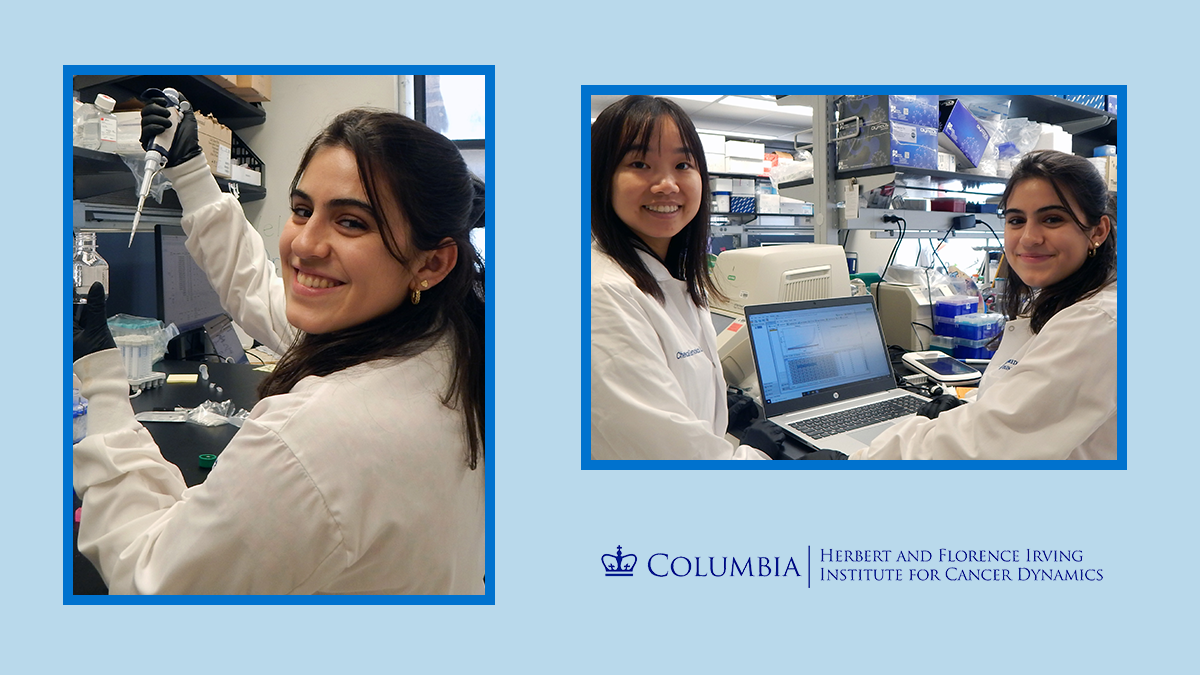
Hannah Khanshali (She/Her) is a rising senior in biology at the City College of New York. She is mentored by Drs. Elham Azizi and Lingting Shi. Her research focuses on spatial T-cell receptor profiling of cancer tissue in mice and humans to dissect tumor and immune co-evolution.
1/ How did you get interested in science and doing research?
I have always been interested in science since I was very young; I loved nature and finding creatures and was especially influenced by my mother who was a biology major herself. When I entered college, I declared a biology major in hopes of it being a track to Veterinary school. However, in the summer before my junior year, I realized I loved the science of my classes and subjects such as molecular biology, biochemistry, cellular biology, organic chemistry, so much more than the medical applications in Veterinary medicine and changed my path to research and biotechnology. I found myself thrilled to explain topics to my friends, and asking questions that I sometimes found out were current research questions themselves and yet to be explored. I felt so connected to the research community at my school through my professors and learning of their research, it inspired me to get involved. When I began doing research at my school in the Carnaval Lab performing biogeographical and evolutionary research, I felt that my brain was specifically wired to be involved in research; I love asking questions and exploring, and as my postdoc mentor Dr. Lingting Shi in the Azizi lab has said, everything intrigues me.
2/ What is your favorite thing about science?
My favorite thing about science is the diversity and wide array of subjects it entails. There are hundreds of different subjects and sub-disciplines to explore, and I have been interested in many such as evolutionary biology, structural biology, biochemistry, cell and molecular biology, computational biology, and more!
3/ What are your plans after receiving your undergraduate degree?
I hope to pursue a master’s degree in computer science with a concentration in computational biology, to enhance my skills to make progress in the computational bio world with my knowledge of biology and apply this knowledge; I also plan to continue engaging in research and the biotechnology world, and possibly pursue a PhD after my masters.
4/ If you could be any scientist, who would it be and why?
If I could be any scientist, I would be Rosalind Franklin. She is naturally an inspiration to all women in science, but I am amazed by her as she was the only woman working on discovering the molecular structure of DNA. She unfortunately is not often given the credit she deserves in her contribution to the discovery of DNA structure. I would want to be Dr. Franklin, because given all her obstacles, she persevered becoming one of the most skilled and talented scientists of her time, inspiring me to work even harder in my research efforts.
5/ Tell us a fun fact about yourself.
A fun fact about me is that I am a musician and vocalist, even before I was interested in science! I write my own music and play guitar. I am also trained in opera and classical vocal music as well as participated in choirs in my time at Fiorello H. LaGuardia High School for vocal music.
6/ What do you like to do when you are not in the lab?
When I am not in the lab, I love writing music with friends, hiking, taking photos or making art such as collages. I love photography and learning more about cameras and how to show my individuality in my photography just like my music.
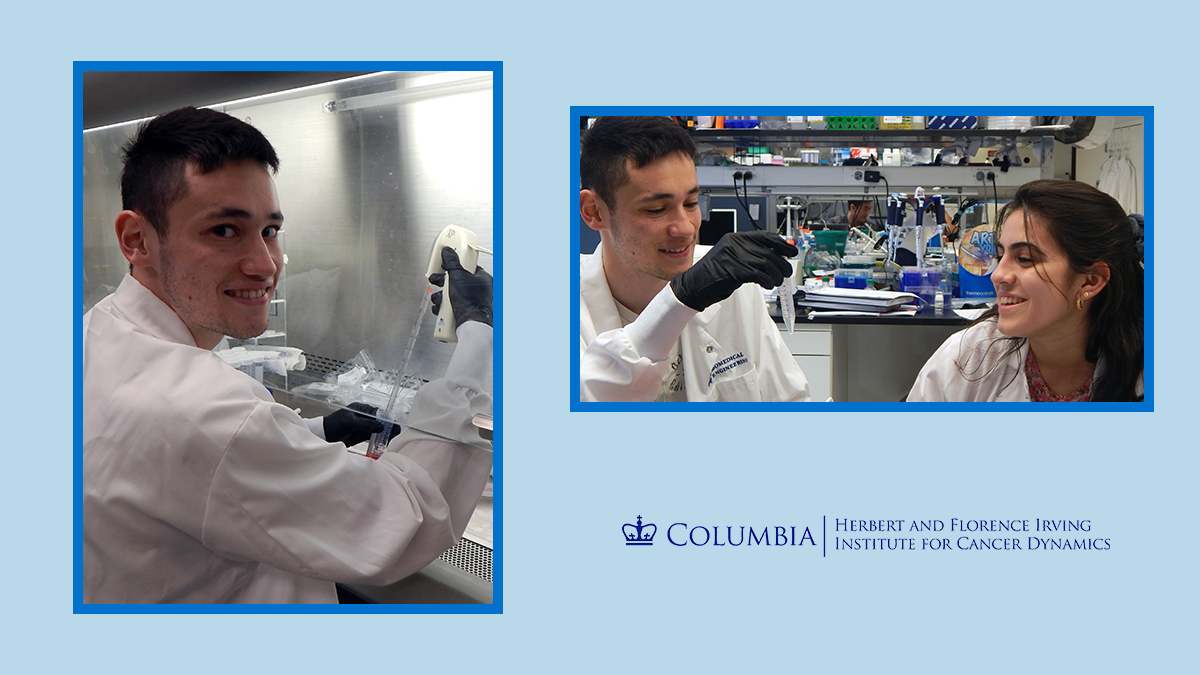
Henry Kotkin (He/Him) is a rising senior in chemistry and economics at Kenyon College. He is mentored by Dr. José McFaline-Figueroa. His research focuses on investigating genetic causes for recurrent glioblastoma resistance to Temozolomide treatment at single cell resolution.
1/ How did you get interested in science and doing research?
High school chemistry and AP chemistry sparked my interest in science initially. I felt like the concepts came naturally to me, so I decided to continue with the subject in college. Research, especially wet lab research, has always been interesting to me as a tangible and applied complement to the classroom work I’ve been doing.
2/ What is your favorite thing about science?
Building off of the last question, it’s always been really easy for me to see the real-world implications of anything I study in my chemistry course. It sparks my curiosity in what is going on at the chemical level in mundane things – I want to be able to explain everything with science!
3/ What are your plans after receiving your undergraduate degree?
While my plans are not yet set in stone, after I receive my undergraduate degree, I believe I want to continue with higher education in chemistry or biochemistry. My end goal is still to be determined, be it academia or some other pathway. I do think I will take time off after graduating and maybe live abroad, possibly in Paris where I studied abroad, and find a temporary but relevant job as I start to figure out my end goals more clearly.
4/ If you could be any scientist, who would it be and why?
I would be whoever is the current top food scientist at one of the top soccer teams in the world, because this would perfectly combine three of my interests/passions: soccer, cooking, and science. I would have access to plenty of data regarding players’ diets and specific foods’ benefits and drawbacks, designing player diets, which would be very interesting in itself, but I would also get to meet some of the best soccer players in the world.
5/ Tell us a fun fact about yourself.
One fun fact about me is that I started cutting my own hair in the beginning of the pandemic, which is easier than it sounds because I bought a hair-cutting electric razor. I have occasionally also cut my friends’ hair, including doing three people (including myself) for a Peaky Blinders Halloween costume this past Halloween.
6/ What do you like to do when you are not in the lab?
I love to play soccer, which I have done since I could walk. I also really enjoy cooking, a hobby I’ve picked up relatively recently but have been refining over the past couple of years. I also am a huge music person and I record music with some of my friends, one of whom has a home studio setup.
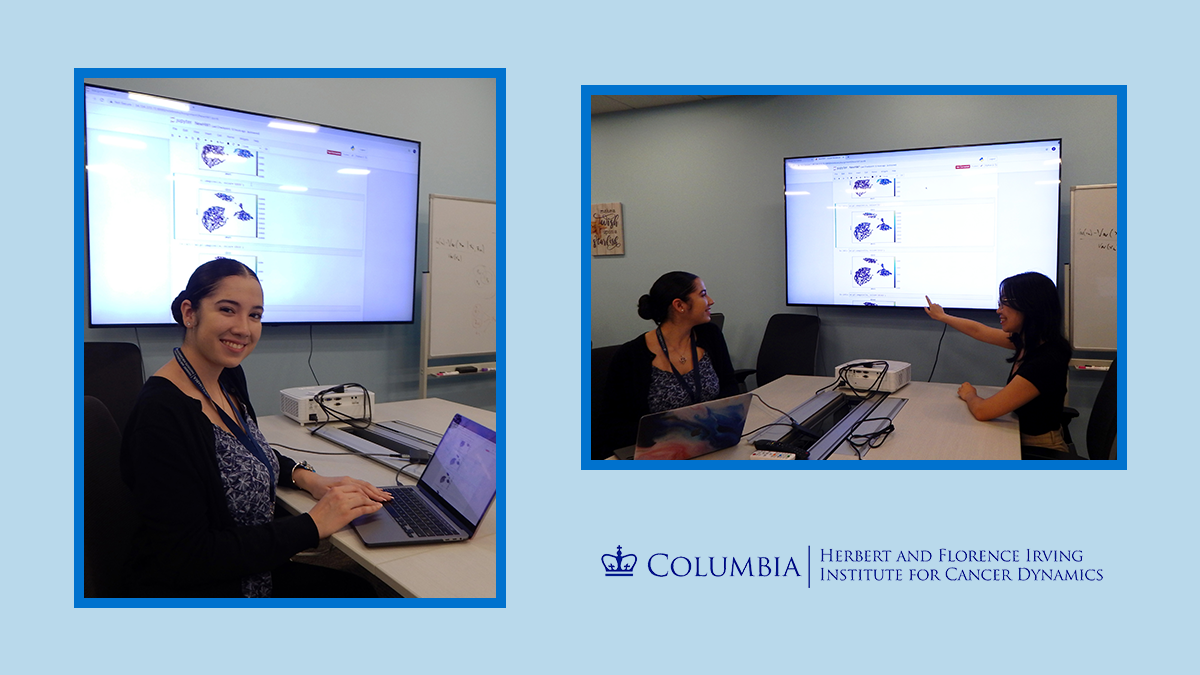
Anabel Ojeda (She/Her) is a rising junior in mathematics at Adelphi University. She is mentored by Dr. Elham Azizi and Linyue (Joy) Fan. Her research focuses on mapping genotype to phenotype through joint probabilistic modeling of single-cell gene expression and chromosomal copy number variation.
1/ How did you get interested in science and doing research?
I became interested in science and research after losing my grandmother to a rare form of liver cancer in 2021. One of my professors at Adelphi who I consider my mentor, Dr. Anil Venkatesh introduced me to another professor, Dr. Nara Yoon, who had recently published a paper on the application of discrete mathematics in drug resistance within cancer treatment. When I discovered that the study of mathematics could be applied to the field of cancer research, I knew I had discovered my true passion because it allows me to dedicate myself to making a difference in the world and work towards revolutionizing cancer treatment to help more people achieve remission following their cancer diagnosis.
2/ What is your favorite thing about science?
My favorite thing about science is the concept of evolution. Every day and in every way, the world is changing and as scientists we are given the opportunity to investigate what we already know in order to change the future.
3/ What are your plans after receiving your undergraduate degree?
My plans after receiving my undergraduate degree are to continue my studies and pursue my master’s degree in Applied Mathematics and Data Science at Adelphi University. I am currently enrolled in the 4+1 program that allows me to earn my Bachelor of Science in Mathematics with a Master of Science in Applied Mathematics and Data Science. My dream job would be to work as a data scientist at Memorial Sloan Kettering Cancer Center.
4/ If you could be any scientist, who would it be and why?
If I could be any scientist, I would be Rosalind Franklin because her work contributed to the understanding of DNA, molecular structure, and genetics. I am fascinated by the idea of discovering a concept that could alter society’s knowledge of a subject. I am excited to publish something meaningful that will contribute to science through my work with the IICD and my mentors Elham Azizi and Joy Linyue Fan.
5/ Tell us a fun fact about yourself.
A fun fact about myself is that I have a passion for dance. I started dancing at four years old and pursued it all throughout high school as a dance major at Frank Sinatra School of the Arts High School. I was a full-time dance student as well as a Teacher’s Assistant at my personal dance studio. I studied all genres of dance, tap, jazz, ballet, modern, and pointe.
6/ What do you like to do when you are not in the lab?
When I am not in the lab, I love to read. Reading is my way of escaping into another world, it allows me to imagine what I am reading as if the pages were scenes in a movie. I have a list of books that I cannot wait to read this summer, but my all-time favorite is A Walk to Remember by Nicholas Sparks.
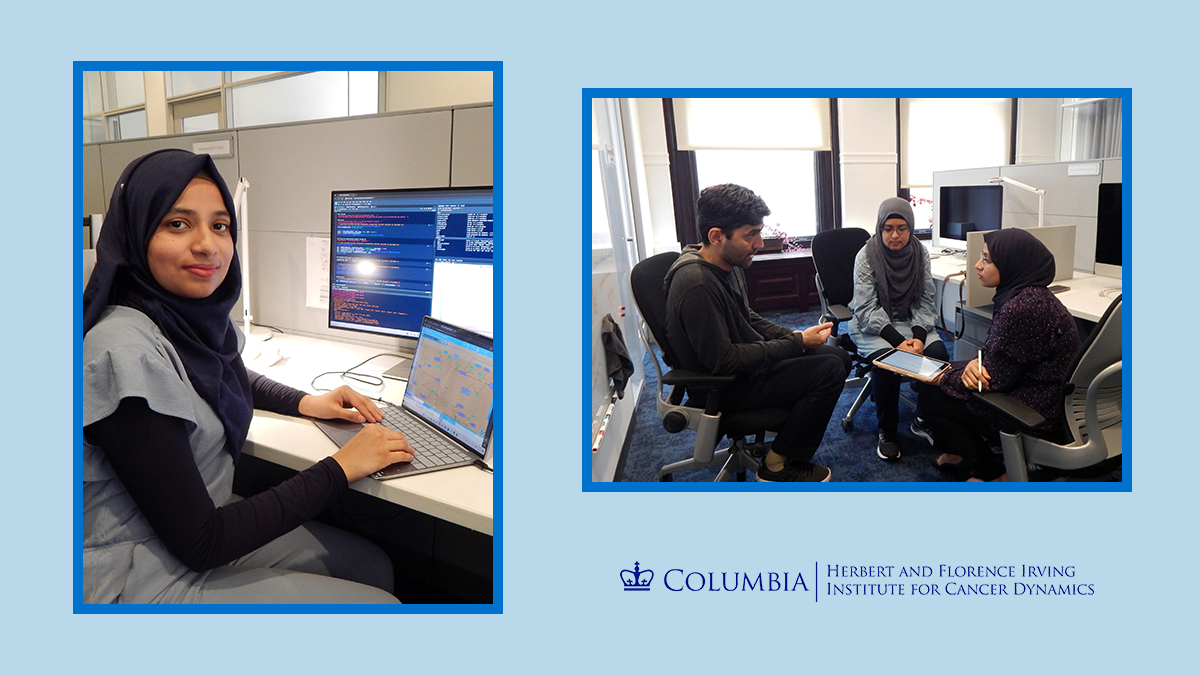
Nafisa Raisa (She/Her) is a rising senior in mathematics/computer & information science and biological sciences at Fordham University. She is mentored by Drs. Poly Hannah da Silva and Arash Jamshidpey. Her research focuses on assessing the accuracy of parsimony methods in some genome evolution models.
1/ How did you get interested in science and doing research?
I became interested in Biology in my freshman year of high school. I really loved learning about different biological concepts, especially cancer biology. Then in my senior year of high school, while participating in a hackathon, Computer Science piqued my interest. I had always been a math lover. In college, I learned about fields like Bioinformatics, Computational Biology, and Computational Medicine that draw from Math, Computer Science, and Biology. Seeing how these disciplines are a combination of everything that I love, I applied to a lot of summer research opportunity programs in those fields. While pursuing a research internship in Biomedical Data Science at the University of Wisconsin-Madison, I became interested in research.
2/ What is your favorite thing about science?
I believe science expects you to be curious and inquisitive. Many great inventions of science happened due to someone being extremely curious about a topic. As a person, I am naturally very curious and inquisitive and science allows me to be myself.
3/ What are your plans after receiving your undergraduate degree?
I want to continue my research in Bioinformatics, Computational Biology, and Computational Medicine.
4/ If you could be any scientist, who would it be and why?
If I could be any scientist, I would like to get the best quality of all the great scientists and become a new scientist who is the best version of all of them.
5/ Tell us a fun fact about yourself.
I love doing henna.
6/ What do you like to do when you are not in the lab?
I am very talkative. So when I am not in the lab, I like to walk with a friend and chat. Chatting with my friends makes my day
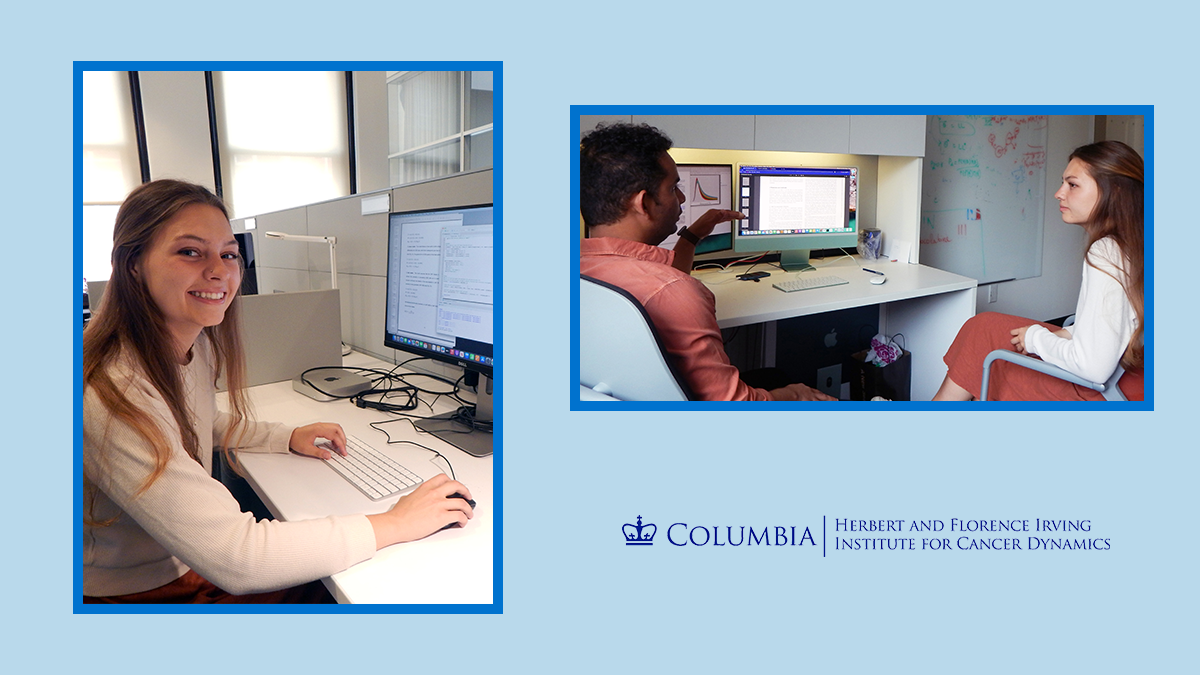
Julia Rehring (She/Her) is a rising junior in mathematical biology at the University of Michigan, Ann Arbor. She is mentored by Dr. Sanket Rane. Her research focuses on mechanistic and probabilistic models of B cells during immune responses.
1/ How did you get interested in science and doing research?
When I was a freshman in high school, my dad ended up in the hospital with bacterial meningitis and was able to fully recover thanks to the hard work of the dedicated nurses and doctors. When this happened, I did a lot of my own independent research on the biology of everything that was happening to him, as I wanted to understand it. After this, I continued to be interested in and learn about biology and diseases in particular. I specifically became interested in Mathematical Biology when I learned how calculus was used to revolutionize how AIDS/HIV was treated in the 90s. From then on, I became inspired to use my love of math to research biological phenomena.
2/ What is your favorite thing about science?
My favorite thing about science is that there are an endless number of questions that can be asked and explored. I think it's so interesting that there is always more to learn about the world around us.
3/ What are your plans after receiving your undergraduate degree?
After receiving my undergraduate degree, I plan to get into the biotech research industry, where I would get to apply my passion and knowledge for math, technology and biology. After spending some time working, I hope to return to academia and pursue my masters of PHD after getting some real-world experience.
4/ If you could be any scientist, who would it be and why?
If I could be any scientist, I would be Dr. Trachette Jackson. She is currently an accomplished mathematical oncologist and an esteemed mathematical biology professor at the University of Michigan. Not only has she made incredible contributions to the field of mathematical oncology with her work on modeling tumor angiogenesis, she also does a lot of work to promote diversity within the community and encourage young underrepresented minority students to study and join the field. I hope to make this kind of contribution, not only to advance the understanding of biology through mathematics, but also to develop a welcoming and inspiring culture.
5/ Tell us a fun fact about yourself.
I am the reigning back-to-back champion of my fantasy football league.
6/ What do you like to do when you are not in the lab?
I'm originally from Colorado so I have a deep love and appreciation of the outdoors. I love anything I can do outside; running, hiking, skiing, climbing, or even just sitting out where there is some greenery.
